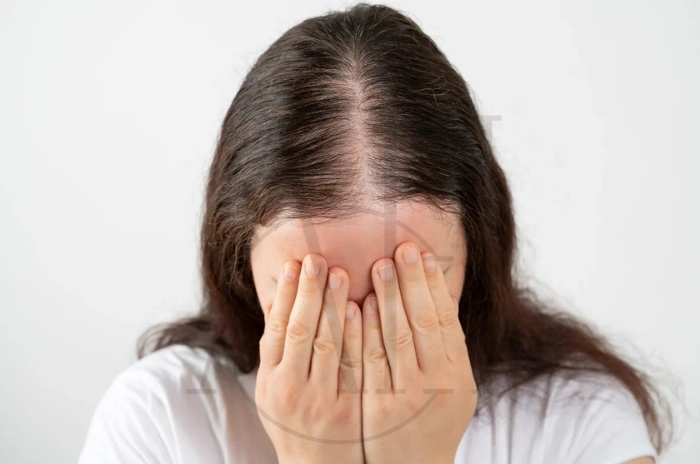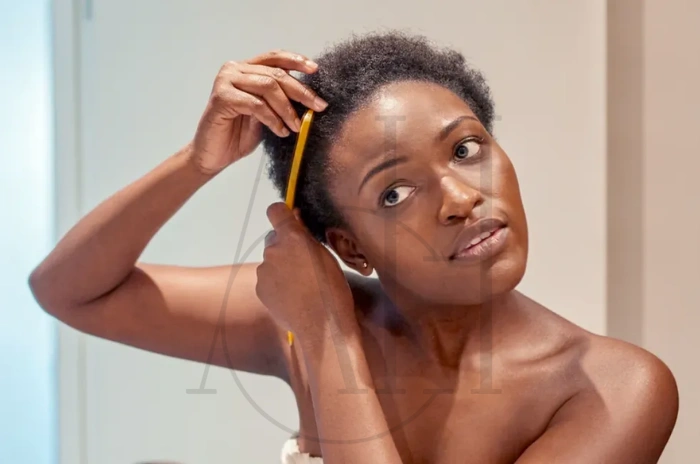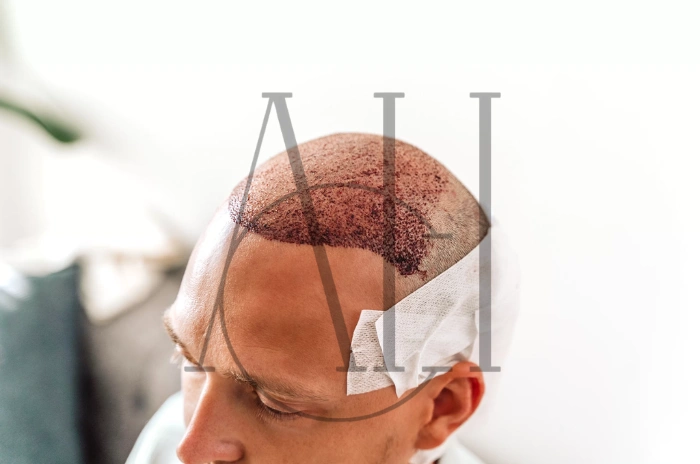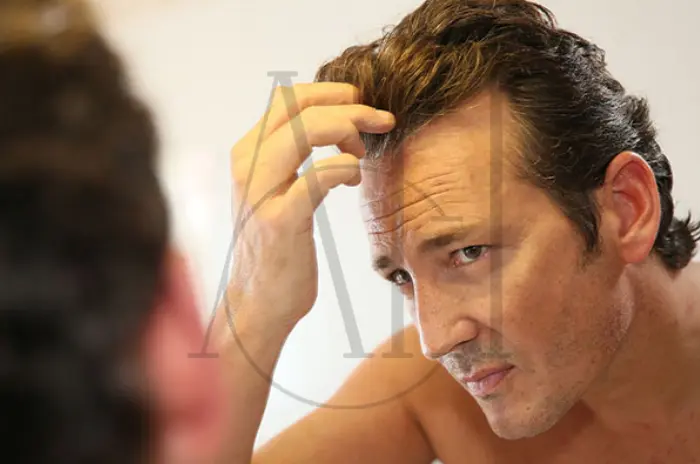Hair loss can be distressing, especially when you’re already dealing with mental health challenges. Many people experiencing depression wonder if their emotional state could be contributing to their thinning hair or bald spots. The connection between mental health and physical symptoms is more significant than you might think.
Research shows that depression can cause hair loss through multiple pathways. The relationship works both ways – depression can trigger hair loss, and hair loss can worsen depression, creating a challenging cycle. Understanding this connection is the first step toward addressing both issues effectively.
When you’re dealing with depression, your body experiences chronic stress. This stress affects your hormone levels, immune system, and overall health. These changes can disrupt your hair growth cycle, leading to noticeable hair thinning or loss.
The good news is that depression hair loss is often temporary. With proper treatment and care, both your mental health and your hair can recover. Recognizing the signs and understanding your options can help you take control of your situation.
Table of Contents
ToggleThe Link Between Depression and Hair Loss
Depression affects your body in ways that extend far beyond your emotional state. When you’re depressed, your body produces higher levels of cortisol, the primary stress hormone. Elevated cortisol levels can disrupt the normal hair growth cycle, pushing hair follicles into a resting phase prematurely.
Your immune system also changes during depression. Some people develop autoimmune responses that target hair follicles, leading to conditions like alopecia areata. This type of hair loss creates round patches of baldness and is strongly linked to emotional stress and mental health conditions.
Sleep disturbances, common in depression, further complicate hair health. Your body repairs and regenerates tissues during sleep, including hair follicles. Poor sleep quality interferes with this process, weakening hair and making it more likely to fall out.
Nutritional deficiencies often accompany depression. When you’re depressed, you might lose your appetite or make poor food choices. Lack of essential nutrients like iron, zinc, biotin, and protein directly impacts hair strength and growth.
Common Types of Hair Loss Linked to Depression
Understanding the different types of depression hair loss can help you identify what you’re experiencing and seek appropriate treatment.
| Hair Loss Type | Characteristics | Timeline | Recovery |
|---|---|---|---|
| Telogen Effluvium | Diffuse thinning, 100-300 hairs lost daily | 2-3 months after stress onset | 6-12 months with treatment |
| Trichotillomania | Patchy, irregular hair loss from pulling | Ongoing during episodes | Variable, depends on behavior control |
| Alopecia Areata | Round patches of complete hair loss | Can occur suddenly | Often spontaneous regrowth |
| Androgenetic Alopecia | Pattern baldness accelerated by stress | Gradual progression | Permanent without intervention |
Telogen effluvium is the most common type of stress hair loss associated with depression. This condition pushes hair follicles into a resting phase, causing increased shedding about 2-3 months after emotional stress begins.
Trichotillomania involves compulsive hair pulling as a coping mechanism for depression and anxiety. The resulting hair loss creates patchy, irregular patterns on the scalp, eyebrows, or eyelashes.
Alopecia areata creates round patches of complete hair loss triggered by severe emotional stress. This autoimmune condition can affect any part of the body where hair grows.
Antidepressants hair loss may occur with certain medications, though bupropion hair loss is less common than with other antidepressants.
Signs That Depression Is Affecting Your Hair
Recognizing the signs that depression and hair thinning are connected can help you address both issues more effectively. One of the first signs is a noticeable increase in daily hair shedding. If you’re finding significantly more hair on your pillow, clothes, or in the shower, this could indicate stress-related hair loss.
Changes in hair texture often accompany depression-related hair loss. Your hair might become more brittle, dry, or prone to breakage. You may notice that your hair lacks its usual shine or feels thinner when you run your fingers through it.
The timing of hair loss can provide important clues. Stress-induced hair shedding typically begins 2-3 months after a major stressful event or the onset of depression symptoms. If you can connect your hair loss timeline to your mental health struggles, this suggests a relationship between the two.
Pay attention to the pattern of hair loss. Depression-related hair loss often affects the entire scalp rather than specific areas. You might notice your ponytail feels smaller or your part appears wider.

How to Stop Hair Loss Caused by Depression
Addressing how to stop stress hair loss requires a comprehensive approach that tackles both your mental health and hair care needs. The most important step is treating the underlying depression. Working with a mental health professional to develop an effective treatment plan will help reduce the stress that’s contributing to your hair loss.
Stress management techniques play a crucial role in stopping depression-related hair loss. Regular exercise, meditation, deep breathing exercises, and yoga can help lower cortisol levels and reduce the physical impact of stress on your body.
Nutrition is essential for hair regrowth after depression. Focus on eating a balanced diet rich in protein, iron, zinc, biotin, and vitamins A, C, and D. Foods like lean meats, fish, eggs, leafy greens, nuts, and seeds provide the nutrients your hair follicles need to function properly.
Best vitamins for hair loss include biotin, iron, zinc, vitamin D, and B-complex vitamins. However, it’s important to get blood tests to identify any specific deficiencies before starting supplements.
Gentle hair care practices can help minimize further damage while your hair recovers. Use a shampoo for stress-related hair loss that’s sulfate-free and contains ingredients like biotin, keratin, or caffeine. Avoid tight hairstyles, excessive heat styling, and harsh chemical treatments.
Can Hair Grow Back After Depression?
The encouraging news is that hair regrowth after depression is not only possible but common. Most types of depression-related hair loss are temporary, and hair typically begins to regrow once the underlying stress and mental health issues are addressed.
Telogen effluvium hair loss usually reverses within 6-12 months of treating the underlying depression. You may start to notice new hair growth as small, fine hairs appearing along your hairline and throughout your scalp.
The timeline for hair regrowth varies depending on several factors. The severity and duration of your depression, your overall health, age, and genetics all influence how quickly your hair recovers. Most people begin to see improvement within 3-6 months of starting effective depression treatment.
For trichotillomania treatment options, behavioral therapy combined with stress management often leads to successful hair regrowth. Once the compulsive pulling behavior stops, hair follicles that weren’t permanently damaged can begin producing hair again.
Evidence-Based Treatments and Self-Care
Professional treatment for hair loss and mental health often involves a multidisciplinary approach. Mental health treatment should be your primary focus, as addressing the root cause of stress will have the most significant impact on your hair recovery.
Therapy options include cognitive-behavioral therapy (CBT), which helps you develop healthier coping mechanisms for stress and depression. For trichotillomania, specialized behavioral interventions can help you break the hair-pulling cycle. Support groups for people dealing with both mental health and hair loss can provide valuable emotional support.
Medical treatments for depression may include antidepressants, but it’s important to discuss potential hair loss side effects with your doctor. Some medications are less likely to cause hair loss than others. Your doctor can help you find an effective treatment with minimal impact on your hair.
Natural remedies for hair thinning can complement professional treatment. Scalp massage with essential oils like rosemary or peppermint may stimulate blood flow to hair follicles. However, these should supplement, not replace, proper medical care for depression.
Topical treatments for hair loss, such as minoxidil, may be recommended in some cases. These can help stimulate hair regrowth while you’re addressing the underlying depression. Always consult with a dermatologist or healthcare provider before starting any hair loss treatments.
Regular monitoring is important for tracking your progress. Keep a journal of your mental health symptoms, stress levels, and hair changes. Take photos to document your hair’s recovery over time. This information can help your healthcare team adjust your treatment plan as needed.
FAQ :Could Depression Be Causing Your Hair Loss?
Can depression directly cause my hair loss?
Yes, depression can directly cause hair loss through increased stress hormones, immune system changes, and disrupted sleep patterns that affect hair growth cycles.
How do antidepressants affect my hair?
How do antidepressants affect my hair?
Some antidepressants may cause hair thinning as a side effect, but the benefits of treating depression often outweigh this risk, and hair usually recovers with time.
Will my hair grow back eventually?
Most depression-related hair loss is temporary, and hair typically regrows within 6-12 months once depression is effectively treated and stress levels decrease.
What is stress-induced hair shedding?
Stress-induced hair shedding, or telogen effluvium, occurs when stress pushes hair follicles into a resting phase, causing increased daily hair loss that usually appears 2-3 months after the stressful event.




